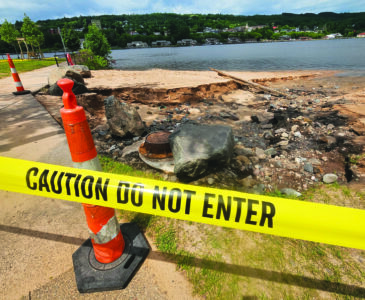Recreation for a cause
Funds raised at Fall Outdoor Festival for deer feeding

Potential buyers peruse the Hidden Pines Barn where the Outdoor Festival hosted by the Calumet-Keweenaw Outdoorsmen Club took place. There were over 20 vendors selling various outdoor recreational wares with he funds raised from entry going towards the supplemental deer feeding program to help preserve the deer population in the Keweenaw Peninsula during the winter. (Ben Garbacz/Daily Mining Gazette)
The Calumet-Keweenaw Outdoorsmen Club held its Fall Outdoor Festival on Friday and Saturday to raise funds for its supplemental deer feeding program. The festival took place inside Hidden Pines Barn where raffles for prizes were held and vendors throughout Michigan sold a variety of outdoor recreational items including fishing gear, firearms, knives, ammunition and holsters. Some tables also sold different items such as military memorabilia, crafts, jewelry, leather items, baked goods, woodworks and patches. This is due to the intention to expand beyond a firearm focused show in the future and branch out into all aspects of outdoor activities. The president of the Calumet-Keweenaw Outdoorsmen Club, Tom Helppi, said that all types of outdoor recreational vendors and enthusiasts will be welcomed in coming years.
“[We want to] bring in snowmobile dealers, ATV dealers, mountain bikes, kayaks, canoes, everybody and anybody that sells and enjoys anything for the outdoors,” he said.
The new items and interests being featured were not the only new additions to this year’s festival since the purchasing of firearms in Michigan underwent another step compared to last year regarding private sales between citizens. Helppi said that it was important to still put on the show and encourage participation in events such as these to show that it’s still possible to have them despite stricter firearm laws. He does not want people to become reluctant from participating in their hobbies and thus the club was sure to demonstrate that they were operating in accordance to firearm laws in Michigan.
A background check must be implemented between the seller and consumer at events such as this, so the club had requested the assistance of the owner of Northwoods Sporting Goods and a Federal Firearms Licensee, Rick Freeman. For a fee Freeman would perform a background check on any buyer to ensure that all transactions were legal in the eyes of the Michigan legal system.
“It just adds an extra step to the process,” Freeman said. “At the end of the night I got to go back to my store to do the acquisition for the firearm through that person and the disposition to the other person. A guy was shocked when he had to do it (a background check). I mean, they (government) have to enforce the laws that are actually there but when those laws do not work, they make new ones then, but it almost seems like they’re punishing the people that want to do it the right way. A criminal is never going to go and do a background check. So my thought about it is I dislike it.”
Despite the annoyance some attendees had with the new regulations, the reception of the event was overwhelmingly positive and Freeman was happy to be involved in a social gathering centered on the things he loves in life and to see old and used items find new homes to see use again.
“It’s a chance where people could come together and say, ‘Hey, you know, I want to get rid of this firearm, this knife, this bow or crossbow or something like that,'” he said. “And what they say is, another man’s trash is another man’s treasure.”
Attendees enjoyed food and drink while conversing with one another over hunting and fishing trips of years past and sharing their plans for the upcoming deer season. The preservation of the whitetail deer was the chief reason for the event with the funds raised assisting in its maintenance in the Keweenaw Peninsula. The club’s board of directors secretary, Richard Marsh, said that the program is vital due to the uniquely harsh winters the Keweenaw faces each year that is far more brutal than anywhere else in the Upper Peninsula.
“We’re running 300 to 360 inches [of snow] a year on average,” Marsh said. “That’s a lot of snow. And what really makes it difficult is that typically, in a normal winter here, we’re running with a snow base of two to three feet of snow for the biggest percentage of the winter. And the DNR (Department of Natural Resources) will tell you that a winter is critical for the deer if you have more than 100 consecutive days with snow depths beyond 12 inches. Well, since 2010 we’ve only had four winters here in the Keweenaw that didn’t meet that critical standard by the DNR.”
Marsh explained that the supplemental feeding saves a large portion of the deer population in the Keweenaw Peninsula every year since deer can decimate their natural food resources before the height of the winter. He also emphasized that it is important to ensure that pregnant does achieve their needed nutrition since a doe will abort its fawn if it is malnourished which can lead to smaller fawn numbers in the spring. So the club distributes anywhere from 22 to 60 tons of pelletized feed over multiple sites scattered throughout the Keweenaw Peninsula.
The club ensures that the feed purchased from Appleton, Wisconsin meets Michigan DNR regulations and that it is placed in areas where the deer are known to feed during the height of the winter months. After observations regarding all locations with the amount of feed distributed and trail cameras, it is estimated that 1,000 deer a day are fed throughout the Keweenaw in the harshest periods of the winter.
“A good portion of our feed, our monies for that feeding program will come from this show,” Marsh said. “So everybody that shows up here is huge.”




